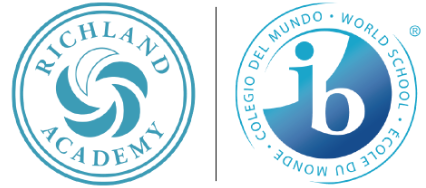The Grade 6 and 7 have been exploring tiling possibilities for an installation that will include approximately 70 colours and 3 simple isosceles triangles based on pentagonal symmetry. Pentagonal symmetry is a fundamental symmetry in nature. Its proportions relate to the Golden Section and the Fibonacci series. It is often described as a blueprint for natural growth. While researching, the students have explored mathematical concepts such as the “Divine Proportion” and the Greek symbol “Phi” . They connected this symbol to one they were already familiar with, namely “”Pi”, used to calculate the circumference of a circle.
One student learned that “the Golden section is mathematically determined and appears in nature and is used by fine artists, sculptors, and architects as a guideline for beauty and harmony” (S.)
Another student learned that “The golden section was used extensively by Leonardo Da Vinici” including in his painting entitled “The Last Supper” as well as in “The Mona Lisa”. (A)
Yet another student learned that the ratio is also “found in nature, flowers, pine cones, human hands and the face”(J)
While exploring these math concepts, they have also been expanding their knowledge of colour theory and colour mixing, as they begin to create the 70 hues of tints and shades in an organized fashion.
In discussions on 21st century learning, there is a strong and increasing acknowledgement that the arts are an integral and important aspect of children’s learning; that “while important to study for their intrinsic value – also promote skill seen as important in academic and life success.”
Lisa Philips, an author, arts and leadership educator in the States lists the top 10 skills children learn from the arts as:
- Creativity
- Confidence
- Problem solving
- Perseverance
- Focus
- Non-verbal communication
- Receiving constructive feedback
- Collaboration
- Dedication
- Accountability
A shift from STEM to STEAM is a movement championed by Rhode Island School of Design and widely adopted by institutions, corporations, and individuals. (STEAM – representing Science, Technology, Engineering, Art & Design, Math)










